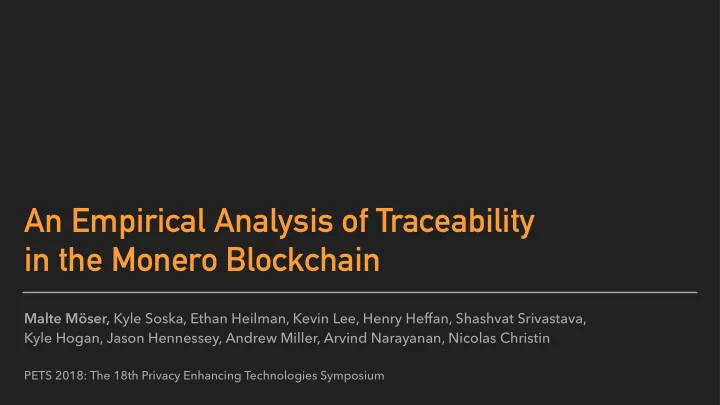

An Empirical Analysis of Traceability in the Monero Blockchain Malte Möser, Kyle Soska, Ethan Heilman, Kevin Lee, Henry Heffan, Shashvat Srivastava, Kyle Hogan, Jason Hennessey, Andrew Miller, Arvind Narayanan, Nicolas Christin PETS 2018: The 18th Privacy Enhancing Technologies Symposium
� 2 Monero ▸ Privacy-centric cryptocurrency (currently top #12)
� 3 AlphaBay starts accepting Monero
� 4 Monero ▸ Privacy-centric cryptocurrency (currently top #14) This Talk ▸ Weaknesses in mixin sampling strategy ▸ Studying the ecosystem: does it matter? ▸ Lessons and conclusion
� 5 Output Selection in Bitcoin each input refers to a single output
� 6 Output Selection in Monero “mixins” each input refers to multiple outputs (with the same denomination)
� 7 Deduction Technique initially no mandatory number of mixins
� 8 Deduction Technique
� 9 Results of Deducibility Attack Getting better over time ▸ 64% of inputs have no mixins ▸ 63% of inputs with mixins are deducible
� 10 Mixin Selection Distributions Probability Probability Probability Time Time Time Triangular Uniform Triangular + recent until January 2016 January-December 2016 since December 2016
� 11 Spend Time of “Real” Inputs and Mixins Number of inputs
� 12 Spend Time of “Real” Inputs Number of inputs
� 13 Spend Time of Ruled-Out Mixins Number of inputs
� 14 Distributions Do Not Match Real Real + Mixins Ruled-out Mixins
� 15 Guess-Newest Heuristic ▸ The newest input is usually the real one ▸ Successful for ▸ 92% of deduced inputs ▸ 80% of all inputs (based on simulation)
� 16 How Can We Fix This? Sample More “Recent” Mixins ▸ More mixins, reduce size of “recent” window ▸ Simulation results in paper Estimate Empirical Distribution Probability Binned Mixin Time
� 17 How Can We Fix This? Sample More “Recent” Mixins Estimate Empirical Distribution ▸ Fit distribution to ground truth data ▸ Good fit: Log-Gamma distribution Binned Mixin
� 18 How Can We Fix This? Sample More “Recent” Mixins Bins Shuffle Shuffle Estimate Empirical Distribution Binned Mixins ▸ Group outputs to defend against timing attacks ▸ Helps against attacker with prior information
� 19 Do These Weaknesses Matter? ▸ Not all transactions are equally privacy sensitive Monero doubles ▸ Goal: quantify block interval different usage types
� 20 Mining Pools Announce Payouts
� 21 Estimating Mining Activity ▸ Miners announce blocks and payouts ▸ Website crawl ▸ # blocks found ▸ # payout txs ▸ 0.44 txs per block related to mining
� 22 AlphaBay ▸ Volume spiked when AlphaBay started accepting Monero AlphaBay starts accepting Monero
� 23 AlphaBay - Daily Volume (Number of Transactions) (nr. of transactions, 7 − day avg.) XMR or BTC 5,000 BTC only Unidentified 4,000 Daily volume 3,000 2,000 1,000 0 Jan 2015 Jul 2015 Jan 2016 Jul 2016 Jan 2017 Date
� 24 AlphaBay ▸ Volume spiked when AlphaBay started accepting Monero AlphaBay starts accepting Monero ▸ At most 25% of txs can be deposits at AlphaBay
� 25 Cryptocurrency Privacy Inherits the Worst of ▸ Data anonymization ▸ Blockchain data is public ▸ Weakness can be exploited retroactively ▸ Communication anonymity ▸ Behavior of some users influences anonymity of others ▸ “Anonymity loves company” cf. Goldfeder, Kalodner, Reisman & Narayanan (2018)
� 26 Summary ▸ Identified and quantified two weaknesses in Monero’s mixin selection ▸ Many privacy-sensitive transactions are vulnerable to deanonymization ▸ More than a thousand transactions per day in late 2016 ▸ Criminal offenses take years to expire (if at all) ▸ Illicit business tends to be early adopters of new technologies ▸ Many legitimate uses that are less visible
Recommend
More recommend